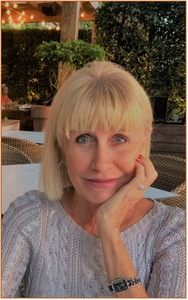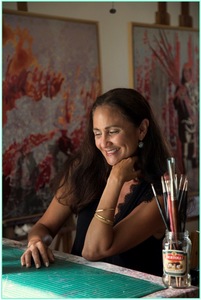This month, I offer a poem, the second in a series, by Adele Ne Jame, a first-generation Lebanese American who has lived in Hawai’i since 1969. She has written extensively about Hawai’i and Lebanon in her poetry collections, including Field Work, The South Wind, Poems, Land and Spirit, and in her new manuscript, First Night at the Beirut Commodore and Other Poems. She has taught poetry at the university level in Hawai’i since 1986, and she has served as the Poet-in-Residence at the University of Wisconsin-Madison. Her work has been published in journals such as the Georgetown Review, Ploughshares, Atlanta Review, Nimrod, the Denver Quarterly, Poetry Kanto, and the Notre Dame Review. Her many awards include a National Endowment for the Arts in Poetry, a Pablo Neruda Poetry Prize, a Robinson Jeffers Tor House Prize and an Eliot Cades Award for Literature. Her poems have been exhibited as broadsides at the Sharjah/ Dubai International Biennial, UAE and at the Arab American National Museum, Dearborn, Michigan. She and her artist daughter, Melissa Chimera, served as the 2022 Mikhail Series Lecturers at the University of Toledo.
Born and raised in Hawai’i, Melissa Chimera is a conservationist whose work consists of research-based investigations into species extinction, globalization and human migration. She has exhibited throughout the U.S., Asia, and the Middle East with solo and curatorial projects, and her work is included in the collections of the Honolulu Museum of Arts and the Arab American National Museum. She is the recipient of the Catherine E. B. Cox Award, finalist for the Duke University Lange-Taylor Prize and was Anchorage Museum’s 2022 Artist-in-Residence and the University of Toledo’s Endowment grantee for her work concerning immigrant narratives.
In the poem below, the speaker recalls her experience of how, in facing an upcoming surgery alone, she discovers an inner strength infused during childhood that is a defining aspect of her identity. Physicians know that it is not uncommon for patients to experience preoperative anxiety. In this case, the speaker faces her operation “with cold dread” because it is not her first, the previous surgery having apparently been a harrowing experience. She is bolstered, however, by “a waking dream” of her mother walking with her to board the flight that will take her to the hospital. The first stanza of the poem prepares us to accept the “radiant power in [her mother’s] bearing”: the mother who had “worked the night shift” to buy an old Oldsmobile and now armed with a few weeks-old driver’s license, fearlessly plows through the dangerous Holland Tunnel connecting lower Manhattan and Jersey City, one of the busiest automotive tunnels in the world. The speaker, recalling this childhood memory, “waited for the walls to cave,” but her mother was “resolute” with a “sure look in her eyes.” In the second stanza, as the speaker, decades later, walks the jetway, alone and terrified, she imagines her mother beside her, “look[ing] straight ahead,” again keeping the speaker “from caving.” She compares her “radiant power” to “a Mozart symphony sweeping [her] along.” As soon as the dream appears, it dissipates: her mother is not there but “thousands of miles away” in a nursing home, moving only with the aid of a walker. Once in the air, the speaker senses Mozart’s “rising music / like a flock of starlings, congregated around us all.” The music she hears is Requiem in D Minor, K626, the final work of Wolfgang Amadeus Mozart (1756-1791). Begun for a patron who had lost his young wife in February 1791, Mozart did not finish the requiem mass, having fallen ill in September of that year; his wife Constanze claimed he believed in his last hours he was writing the mass for his own funeral. It was, indeed, performed in his honor by friends and family at St. Michael’s Church, Vienna, on December 10, five days after his death. Perhaps, the speaker indulges in “musical grief” with Mozart because at this time, her own life and that of her mother hang in precarious balance, and she thus identifies with the chorus’ intonation in the Requiem’s Rex Tremendae movement: “salve me, fons pietatis” (“save me, fount of pity”). In describing her mother’s eyes and mind as “irrefutably vacant,” the poet juxtaposes a quote from Psalm 31:12, “I am a broken jar,” with lyrics from the Confutatis movement of Mozart’s Requiem: “Voca me cum benedictus” (“call me among the blessed”). In the third and fourth stanzas, the poem offers vivid images of the speaker’s mother and her cousin Margarete that underscore the familial solidarity of the cousins who were like sisters, the one opening her “tin of homemade baklava,” the other hurrying “to boil Turkish coffee.” These women had together lived through “the great crash”; the shenanigans of a father who burned a “summer house” for a “fresh start in Miami”; the loss of their husbands while young and the raising of children alone. These women were “invincible.” In a final image of her mother as survivor, the speaker imagines her mother’s story of the cousins’ loss of the red dresses hung on the branches of a tree carried off by the wind “in a blink of an eye.” Ultimately, such losses and hardship are survivable. In going through the “Holland Tunnel” of her personal trauma and trepidation, the speaker realizes that though motherless as Rilke’s orphan, her mother’s determination and strength, her family heritage, were “funneled straight into [her] bloodstream” early on, providing a “dress” that “will keep an eternity.”
The accompanying image of Melissa Chimera’s painting Turn Your Back (oil on linen, 42" x 42") depicts the artist’s grandmother (and the poet’s mother), Genevieve Ferris Ne Jame, whose family immigrated to America from Mt. Lebanon. The artist says the work is stitched in silk and painted with damask floral patterns reflecting the sewing Genevieve’s mother Adele Ferris (pictured in silk beside her) did as a seamstress who created delicate lace for a lingerie house in New York City. The title Turn Your Back expresses the difficulty with which both Genevieve and her husband navigated their ties to the old world, its violence, and fraught family histories. This poem was first published in the Nimrod International Journal (2015).
The editorial assistance of Cathy Chance Harvey, PhD, of Tylertown, in the preparation of this poem is gratefully acknowledged. Physicians and poets are invited to submit poems for publication in the Journal either by email at drluciuslampton@gmail.com or regular mail to the Journal, attention: Dr. Lampton.—Ed.






